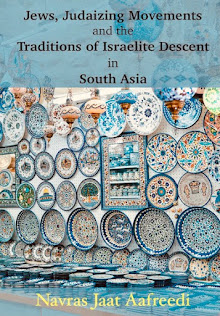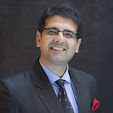Weekly Press Pakistan, September 3, 2013
Truly
committed to raising an awareness of the Holocaust in India and to combating
Holocaust denial, Indo-Judaic Studies researcher and Muslim-Jewish Relations Activist,
Dr. Navras Jaat Aafreedi would be the only Indian to attend the International
Educator Institute at the United States Holocaust Memorial Museum in
Washington, DC, when it takes place from 16th to 20th
September, 2013. Last year in June, he conducted an educational workshop at an
International conference on Holocaust education at Yad Vashem in Jerusalem,
Israel, on how to educate the Indians about the Holocaust.
Inspired
and motivated by him, the students at the Gautam Buddha University in Greater
Noida, India, where he teaches as an Assistant Professor, have produced a Hindi
play on the Holocaust, which they will enact later during the year. It is the
story of the horrors of the Holocaust as witnessed by the soldiers of the
Indian legion of Hitler, which had been raised by the Indian nationalist leader
Subash Chandra Bose by recruiting soldiers from the Prisoner-of-War camps in
Germany which, at that time, were home to tens of thousands of Indian soldiers
of the British Indian army captured by Rommel in North Africa. Bose intended to
use this army to liberate India from the British rule.
Thanks
to Dr. Aafreedi’s efforts, South Asia had its first ever Holocaust films
retrospective in 2009 at the Lucknow University and the Ambedkar University in
Lucknow, a major centre of Muslim scholarship, in Uttar Pradesh, India. This Holocaust Films Retrospective becomes all
the more significant considering the fact that just three years before, a
conference, “Review of the Holocaust: Global Vision”, aimed at denying the
Holocaust had taken place in Tehran from the 11th to the 12th
of December, 2006. And, now this Holocaust films retrospective got organized, not far away in the
Judeo-Christian West, but in close proximity to Iran, in one of the major Shia
cultural centres of the world, Lucknow, right in the centre of the Muslim heartland of South
Asia, home to the world’s largest Muslim population. Lucknow was also home to
the ancestors of the leader of the Islamic Revolution of Iran, Ayatollah
Rouhollah Mousavi Khomeini. His ancestors had settled there in the late
eighteenth century and continued to live there till the mid-nineteenth century
when his grandfather, Seyed Ahmad, migrated to Iran and settled in Khomein,
some 160 kilometres to the southwest of Qom.
While
the films retrospective was in progress, the two most popular Urdu newspapers
there, Rashtriya Sahara and Aag tried to sabotage it by
publishing front-page lengthy stories denying the Holocaust and terming it the
biggest hoax of the twentieth century. But this did not hamper the enthusiasm
of Dr. Aafreedi, who passionately screened forty-eight Holocaust films in a
span of fourteen days and even got a number of Muslim intellectuals to speak
against Holocaust denial. He also organized a number of book readings focusing
on the Holocaust. He continued with his efforts to educate the youth about the
Holocaust even after he moved to Greater Noida, where he joined the Gautam
Buddha University in 2010. As a member of its cultural council, Dr. Aafreedi
screened a number of films on the Holocaust and gave impassioned lectures on
it.
For
years he has been building a library of Jewish Studies. He intends to give free
courses on the Holocaust and Jewish History under the auspices of the
organization he is trying to establish, whose registration is currently stuck
in the red tape of the Indian officialdom.


















